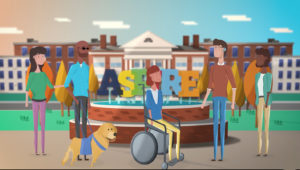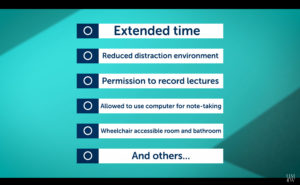When UMW junior Lueden Sheikhnureldin arrived at Simpson Library that early fall morning, something felt off. The old-style wooden chairs in the study area where she’d crammed for so many exams had been replaced by sleek gray-and-green seats.

“I couldn’t concentrate,” said Sheikhnureldin, whose ADHD can cause sensitivity to details like a chair’s texture and feel. “I thought, ‘This is confusing. Everything is changing. I can’t do this.’” She retreated to her Madison Hall room, instead, to study for a biology test.
An English major pursuing a degree in education, Sheikhnureldin is one of hundreds of UMW students with disabilities ranging from ADHD and autism to issues with vision, hearing and movement. “There really isn’t a category that isn’t represented here,” said Jessica Machado, director of the Office of Disability Resources (ODR), which provides services, accommodations and access.
It’s one of the most utilized offices of its type in Virginia, Machado said, with 12 percent of Mary Washington’s more than 4,000 students registered. That’s particularly poignant this month, while the Americans with Disabilities Act (ADA) celebrates its 30th anniversary. UMW officials like Machado are using the milestone to recognize three decades of strides toward equality for the disabled and also the work left to do.
“We must directly challenge the assumptions and effects of ableism and work to ensure that every member of the UMW community can realize their goals and aspirations here, and that all of us together thrive and flourish,” Provost Nina Mikhalevsky wrote in an email to campus.
Along with the Civil Rights Act of 1964, which outlawed discrimination based on race, religion, sex, nationality and more, ADA prohibits discrimination of individuals with disabilities. Now 30, it’s among the equal-rights landmarks UMW’s yearlong Farmer Legacy 2020 celebration aims to commemorate. The initiative – in honor of the 100th anniversary of the birth of the late civil rights icon and former Mary Washington history professor James L. Farmer Jr. – asks all to consider, with every action they take, what Farmer would have done in the same situation.

“He would want us not to forget how far we’ve come,” Sheikhnureldin, who was born 10 years after the ADA took effect, said in a video created by ODR. “Making sure … everything is accessible is something that was not asked when James Farmer was around, and I think he’d want us to remember that. Also that the fight is not over.”
References in the student newspaper to Disability Services at UMW date back to the early 1990s, just after the ADA was passed. Closely aligned with Mary Washington’s statement of values, known as ASPIRE, ODR offers a variety of aid, from classroom and housing accommodations, to assistive technology and provisions for service animals on campus.
As director, Machado, who led George Mason University’s Office of Disability Services and Mason Autism Support Initiative, before arriving at UMW, stays apprised of legalities. She teaches students how to advocate for themselves through ADA and helps them “develop an understanding of their own uniqueness.”
The legislation and resulting reforms have “allowed me to gain access to things that normally I wouldn’t be able to gain access to,” sophomore Adrianna Giddings said on the ODR video.
Its powers are present in the workplace, as well, said Vice President for Equity and Access Sabrina Johnson, who also serves as UMW’s ADA Compliance Officer.
“Through a meaningful application of the ADA’s interactive accommodation process, the university is able to exceed compliance to achieve a true understanding of each employee’s unique experience and plan with them for their long-term overall success,” she said. “The ADA is not about treating anyone differently. It’s about inclusivity for all.”